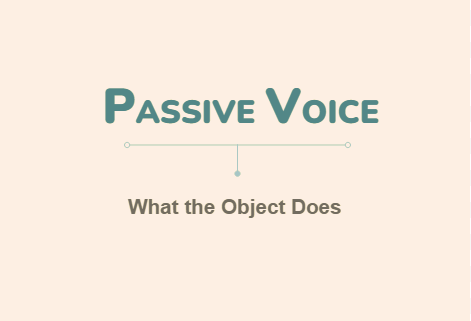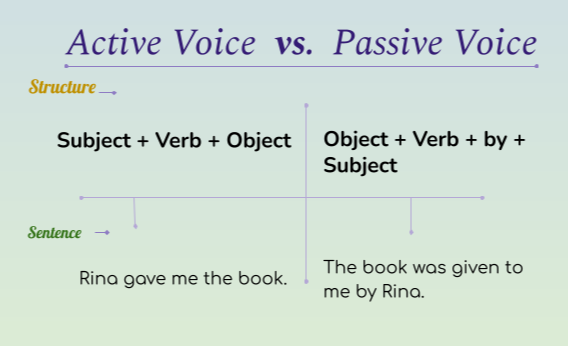Active Voice

Voice is the segment of English grammar where the active or passive involvement of the subject of the sentence is expressed. Changing active voice to passive or vice versa is referred to as Voice Change. With the practice of voice changing, one can better their expertise in the language.
Active Voice
Where the Action Verbs act directly for the Nouns/Pronouns, the sentence has an Active Voice. In the active form, the Subjects of the sentences perform actions directly. The subject is the performer of the tasks. Active Voice Sentence Structure:
| Subject + Verb + Object |
- He will find something in time.
- Rina gave me the book I was looking for.
- I watch all the latest movies.
Subjects are the ones in focus in the sentences in the Active Voice above. They use verbs as per the respective tenses of the sentences. This is how Sentences are naturally constructed in the English language. Without the reference to the Passive Voice, it is rather hard to understand the Active Voice properly.
Transformation of Sentence: Active to Passive Voice
Being able to transform active sentences to passive and vice versa is taken to be one of the measures of one’s expertise in English. The main reason behind it would be the innate conviction to naturally state everything in the active voice.
Present Simple Tense
In terms of present simple tense, sentences with the base verb will be changed to auxiliary verbs - am/is/are accompanied by the past participle form of the base verb. Verb conjugation in the Passive Voice would be-
Am/is/are + Past Participle Verb
Active voice: We play hide and seek.
Passive voice: Hide and seek is played (by us).
| Active | Passive |
| play | is + played |
Past Simple Tense
Changing the past indefinite sentences from active to the passive, past indefinite form of the base verb will become was/were + past participle in the passive voice along with the usual subject-object switches. Verb conjugation in the Passive Voice would be-
| Was/were + Past Participle Verb |
Active voice: They played football in the park.
Passive voice: Football was played in the park (by them).
| Active | Passive |
| played | was + played |
Present Continuous Tense
Changing the present continuous sentences from active to passive, is/are + present participle will become is/are + being + past participle in the passive voice along with the usual subject-object switches. Verb conjugation in the Passive Voice would be-
| Is/are + being + Past Participle Verb |
Active voice: He is playing video games.
Passive voice: Video games are being played by him.
| Active | Passive |
| is playing | are + being + played |
*The auxiliary verbs change according to the subject of the sentence.
Past Continuous Tense
Changing the past continuous sentences from active to passive, was/were + present participle will become was/were + being + past participle in the passive voice along with the usual subject-object switches. Verb conjugation in the Passive Voice would be-
Was/were + being + Past Participle Verb
Active voice: Paul was playing the guitar.
Passive voice: The guitar was being played by Paul.
| Active | Passive |
| was playing | was + being + played |
Present Perfect Tense
Changing the present perfect sentences from active to passive voice, have/has + past participle will become have/has + been + past participle in the passive voice along with the usual subject-object switches. Verb conjugation in the Passive Voice would be-
Has/have + been + Past Participle Verb
Active voice: The kitten has rocked a pair of sunglasses.
Passive voice: A pair of sunglasses have been rocked by the kitten.
| Active | Passive |
| has rocked | have + been + rocked |
*The auxiliary verb changes according to the subject of the sentence.
Past Perfect Tense
Changing the past perfect sentences from active to passive, had + past participle will become had + been + past participle in the passive voice along with the usual subject-object switches. Verb conjugation in the Passive Voice would be-
Had + been + Past Participle Verb
Active voice: You had eaten at least a few pounds of meat.
Passive voice: At least a few pounds of meat had been eaten by you.
| Active | Passive |
| had + eaten | had + been + eaten |
Future and Optative Sentence
These two types change in the same way between active and passive voice. The Modal Auxiliaries are carried into the passive sentences and the base verb is replaced by be + Past Participle Verb.
Will/Shall/Can/May/Must
Verb conjugation in the Passive Voice would be-
Will/shall/can/may/must + be + Past Participle Verb
Active voice: You must clean the office.
Passive voice: The office must be cleaned.
Active voice: Someone will repair the air conditioner tomorrow.
Passive voice: The air conditioner will be repaired tomorrow.
Have/has/had to
Verb conjugation in the Passive Voice would be-
Have/has/had to + be + Past Participle Verb
Active voice: I have to write a letter.
Passive voice: A letter has to be written.
Use of Prepositions
After the passive verb conjugation, the appropriate preposition (mostly -by) is used before the object. Objects are often left out in the passive sentences but when they are important to be mentioned, the correct preposition must be added before it.
Active voice: You must clean the house.
Passive voice: The house must be cleaned by you.
Keeping these few basic voice-changing techniques will help you change active voices into passive ones. Practicing them will make it easier for you to change more complicated sentences in your head.
Grammar
Read More
- How to Use "Therefore" in Sentences Avoiding Common Mistakes
- How to Use "Whereas" with Examples and Avoid Common Mistakes
- When and How to Use "Thus" Correctly Without Common Mistakes
- How to Use "On the Contrary" Properly with Meaning and Examples
- When and How to Use "Either/Or" with Examples and Common Mistakes to Avoid
- How to Use "On the Other Hand" Effectively without Mistakes
- How to Use "Respectively" with Example and Common Errors to Avoid
- How and When to Use "Moreover" Without Mistakes
- How to Use "Likewise" in Sentences Based on Context & When not to Use
- When & How to Use "Although" in Sentences to Avoid Mistake


